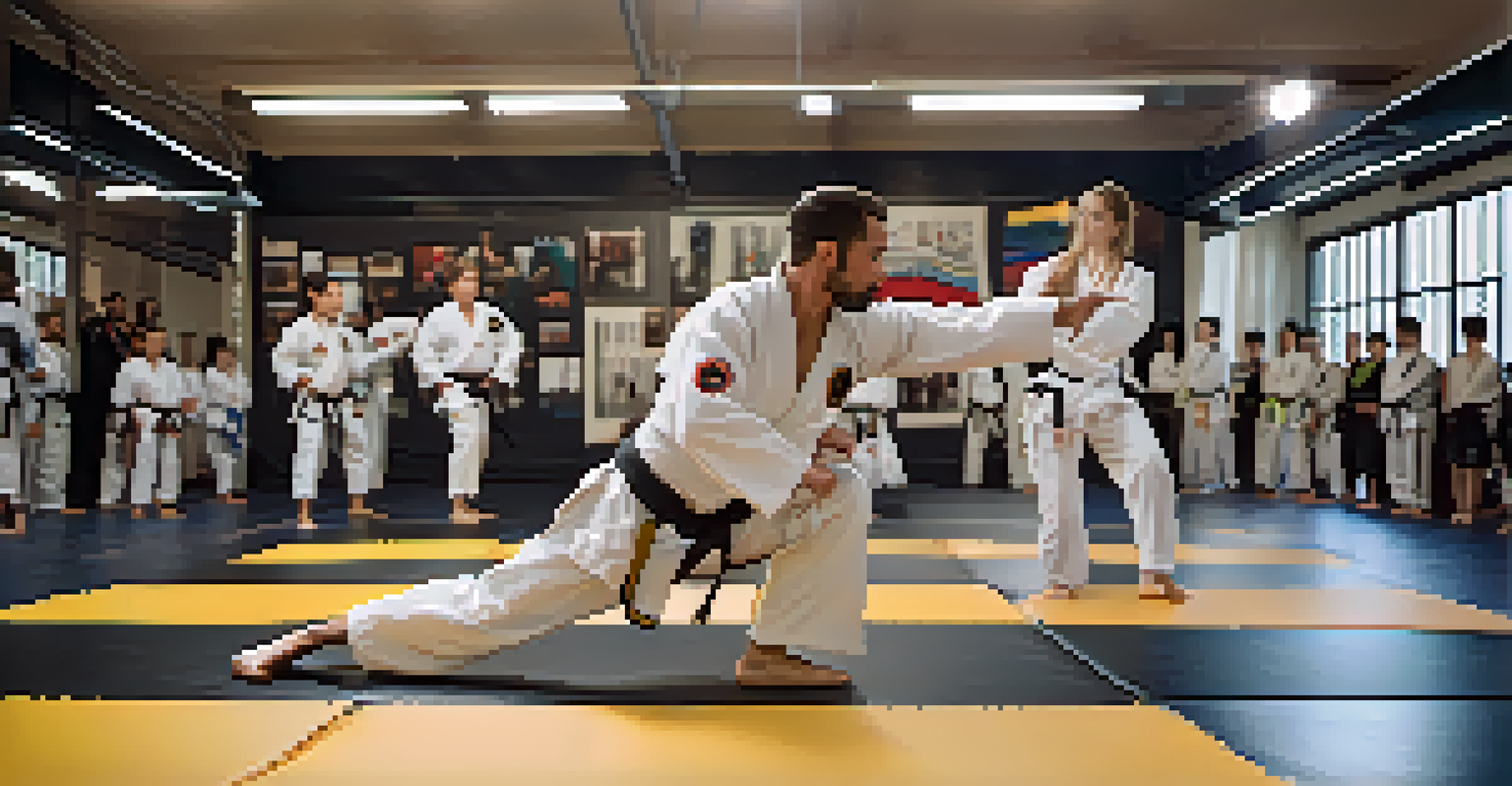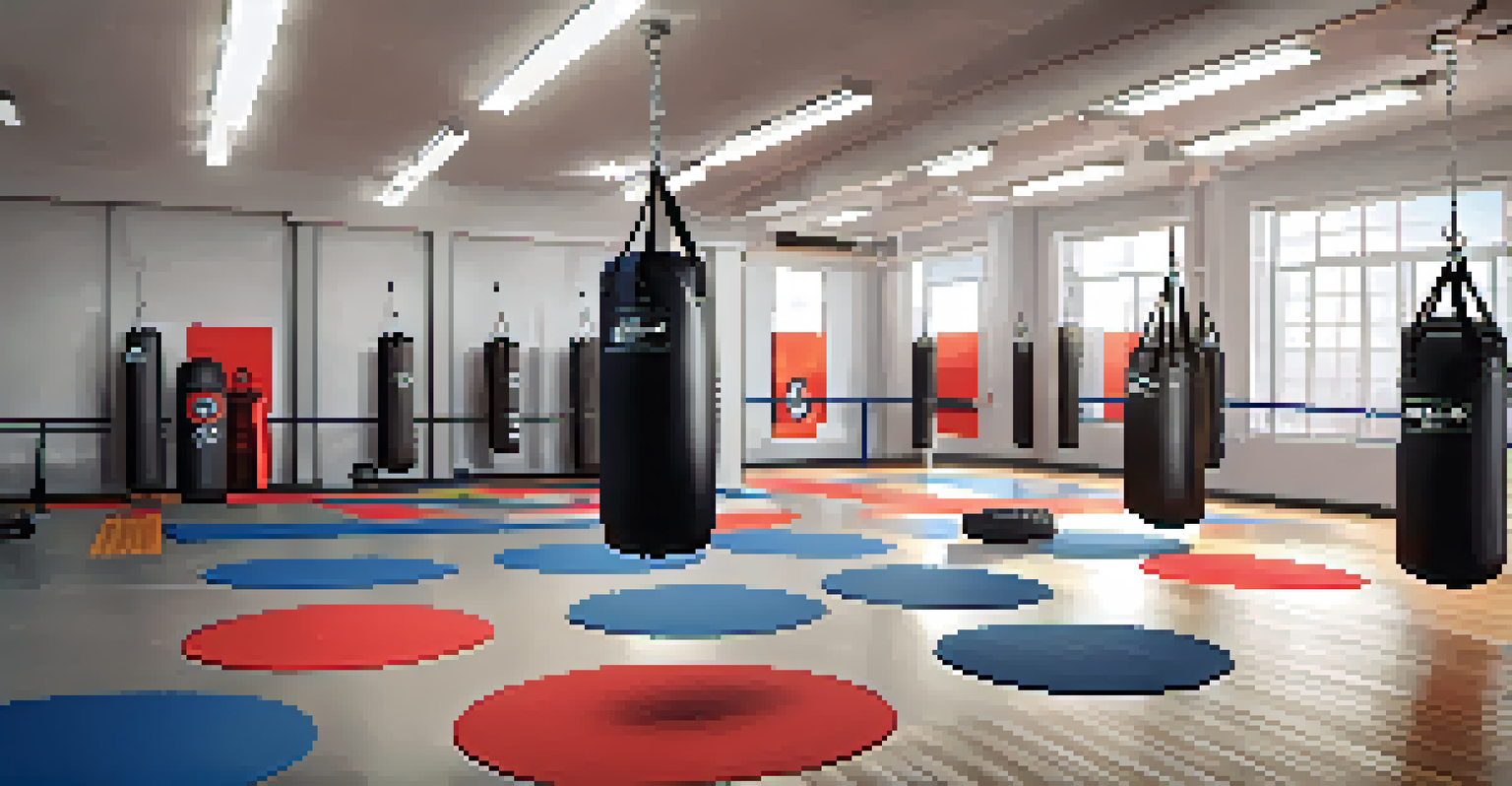How to Choose the Right Self Defense Class for You

Understand Your Self Defense Goals and Needs
Before diving into the world of self-defense, it’s crucial to identify your personal goals. Are you looking to boost your confidence, learn practical techniques, or perhaps get in shape? Understanding what you want to achieve will guide your search for the right class.
Self-defense is not just a set of techniques, but a mindset that you can cultivate through training and awareness.
Take a moment to reflect on your lifestyle and the situations you might face. If you’re a frequent traveler, for example, learning situational awareness could be key. Remember, your goals will shape the type of class that’s best suited for you.
Lastly, consider your current fitness level. Some classes are more physically demanding than others, so being honest about your abilities will help ensure you choose a program that won’t overwhelm you.
Research Different Self Defense Styles Available
Self-defense encompasses a variety of styles, each with unique techniques and philosophies. From Brazilian Jiu-Jitsu to Krav Maga, understanding the differences can help you find what resonates with you. For instance, if you prefer a focus on grappling, Jiu-Jitsu might be your match.

Consider attending introductory classes or workshops to sample different styles. Many schools offer trial classes, which can provide insight into the training methods and the instructor's style. This hands-on experience can be invaluable in making your decision.
Define Your Self-Defense Goals
Identifying your personal goals and needs is essential to finding the right self-defense class that aligns with your lifestyle.
Additionally, think about the environment in which you feel most comfortable. Some styles emphasize competition, while others focus on self-defense in real-life scenarios. Choose a class that aligns with your preference for either a structured or a more relaxed setting.
Evaluate the Instructor’s Experience and Credentials
The instructor plays a pivotal role in your self-defense journey. Look for someone with relevant experience and credentials in the specific style they teach. A qualified instructor will not only have the technical skills but also the ability to communicate effectively.
The best defense is a good offense, but the best offense is knowing how to defend yourself in any situation.
Don’t hesitate to ask potential instructors about their background. Inquire about their training history, teaching philosophy, and how they handle different skill levels among students. A good instructor should foster a welcoming and supportive environment.
Also, consider the instructor's personality. You want someone who motivates you and makes learning enjoyable. Feeling comfortable with your instructor can significantly enhance your learning experience.
Assess Class Size and Training Environment
The size of the class can greatly affect your learning experience. Smaller classes often allow for more personalized attention from the instructor, which can be beneficial for mastering techniques. Larger classes may offer more diverse interactions but could limit individual feedback.
Visit potential schools to observe classes before making a decision. Pay attention to the dynamics between students and instructors. A positive, respectful atmosphere can make a significant difference in your motivation and progress.
Research Self-Defense Styles
Exploring different self-defense styles through trial classes can help you discover the techniques and environments that resonate with you.
Moreover, consider the training space itself. Is it clean, well-organized, and equipped with the necessary tools? A good training environment not only enhances safety but also contributes to an overall enjoyable experience.
Check Class Schedule and Location Convenience
When choosing a self-defense class, practicality matters. Look for classes that fit comfortably into your schedule. If you’re juggling work, family, and other commitments, finding a class that offers flexible times can be a game-changer.
Also, consider the location of the training facility. A convenient location can make it easier to maintain a consistent practice schedule. Whether it’s close to your home or workplace, the less travel time, the better.
Finally, keep in mind the duration and frequency of classes. Some programs may offer intensive sessions, while others have shorter, regular classes. Choose what aligns best with your lifestyle and learning preferences.
Understand the Costs and Payment Options Available
Self-defense classes come with varying costs, so it’s essential to understand what you’re getting for your investment. Some schools may charge per class, while others offer monthly memberships or packages. Be sure to compare what’s included in each option.
Don’t forget to ask about any hidden fees, such as uniform costs or equipment rentals. Understanding the full financial commitment can help you avoid surprises down the line. Transparency about costs is a good sign of a reputable school.
Evaluate Instructors and Class Size
Choosing a qualified instructor and considering class size are crucial for receiving personalized attention and fostering a supportive learning environment.
Additionally, consider the value of the classes relative to their cost. Cheaper isn’t always better, especially if it compromises the quality of instruction. Investing in a quality self-defense class can lead to better skills and a more enriching experience.
Seek Recommendations and Read Reviews
One of the best ways to find a reputable self-defense class is through recommendations. Talk to friends, family, or colleagues who have experience in self-defense training. Their insights can provide valuable firsthand accounts of various classes.
Online reviews can also be a goldmine of information. Websites like Google or Yelp often feature feedback from previous students. Look for comments on the instructor’s teaching style, class structure, and overall experience.

However, keep in mind that everyone’s experience is unique. Use reviews as a guiding tool rather than the sole factor in your decision-making process. Trust your instincts, and choose a class that feels right for you.
Attend a Trial Class Before Committing
Before making a final decision, attending a trial class is a smart move. This gives you a sneak peek into the training style, the instructor’s approach, and the overall atmosphere of the class. It’s like test-driving a car before you buy it.
During the trial, pay attention to how the instructor interacts with students and how they provide feedback. Notice if the class feels welcoming and if students seem engaged and supportive. A positive environment can significantly impact your learning journey.
Lastly, trust your gut feeling. If you leave a trial class excited and motivated, that’s a great sign. Choosing a self-defense class should feel right, not forced. Take your time and enjoy the process of finding the perfect fit for you.